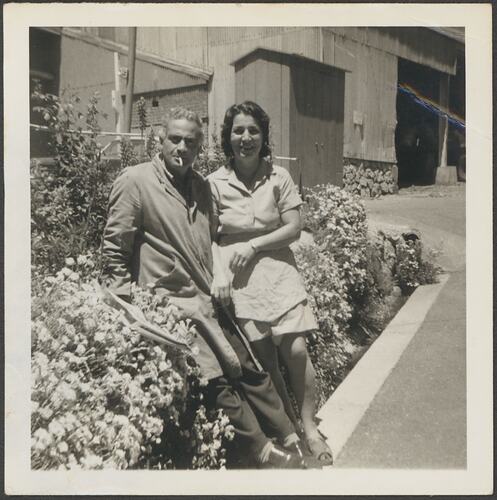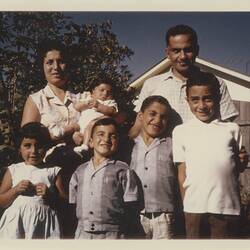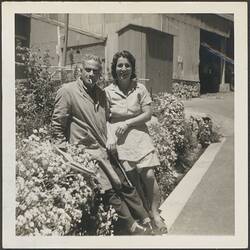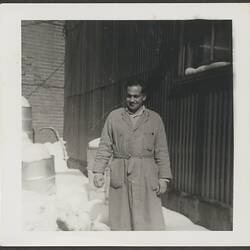Summary
Ahmed Halabi migrated to Australia in 1951, one of the early post World War II migrants from Lebanon.
Background: People from Lebanon were among the first post-World War II Muslim migrants. (Dzavid Haveric, 2019, Muslim Making Australia Home: Immigration and Community Building, Melbourne University Publishing, Melbourne). Ahmed Hicham Halabi, now in his 90s, migrated from Tripoli, Lebanon, to Australia in 1951 and he sees himself as among the first Muslim pioneers in Victoria at that time. (2024) Ahmed's first exposure to Australians was in Lebanon during World War II where the 2nd AIF was stationed. When he was 14-year-old, he recalled, 'The diggers treated us as if we were one of their own kids. We'd invite them home and share a meal with them'. (Ahmed Halabi, 2024) The members of the 2nd AIF certainly did not forget the hospitality and kindness of the Lebanese! They said Lebanese public buildings such as hotels, churches, mosques, and the beautiful countryside of Lebanon 'left on them beautiful memories'. (Ahmed Halabi, 2024) Journey to Australia: Among the 1000 passengers on board, there were 153 Lebanese people who disembarked the ship Protea in Melbourne. Their journey, published in newspapers, was described by Ahmed as: Filthy conditions, inedible and inadequate food, overcrowding... Some were so sick they could not walk and had had to stay in bed all the time. It had been extremely hot. In the Red Sea, and part of the rest of the voyage, was very rough. The dormitories were half dark. There were supposed to be eight people in one room, but there were about 80. Despite these difficulties the Lebanese were quite passionate as passengers. Lebanese will make excellent Australian citizens, for they are a strong, healthy, and honest people. (2024) Settlement and Working Life: Ahmed reflects: 'When I came to Australia, I was very homesick, but I believed in a new, better life', but also what Australians call, a "fair go."'(2024) He worked first at the Railways in Newport, Melbourne but he didn't like the busy city. After three months he asked for a move to Mouth Buffalo Chalet in Victoria's northeast. He moved to Bright where he lived loving the area 'as it reminded him of his village in Lebanon, with gum and wattle trees replacing cedar trees', and the hills and streams.I found peace up there, I enjoyed my work, and the fishing and walking after work, it's a peaceful place.' (Ahmed Halabi 2024) Ahmed worked at the Mount Buffalo Chalet for over forty years as a storeman. He became one of its longest-serving employees. He also adopted an anglicanised name 'Albert.' (Ahmed Halabi 2024) Marriage: In 1956, Ahmed went on holiday to Lebanon and met his wife, Houda, whom he married in 1958. He contributed greatly to the community in sport, social and intellectual activities. With his wife Houda (Hilda), he was actively involved in activities in numerous community organisations. Ahmed and Houda also welcomed many Lebanese who settled or visited the tourist area, making many lasting friends. Houda also worked at the Mt Buffalo Chalet as a housemaid. She also helped in several volunteer organisations, such as the Country Women's Association of Victoria (CWA) where she was the vice president; as well as Meals on Wheels, and the Bright Hospital Op-Shop. (Ahmed Halabi 2024) Later Years: Ahmed was a very keen gardener and fisherman. He would often go fishing in mountain rivers and bring home fresh fish. Houda always remembers ice skating on Mount Buffalo's Lake Catani in the 1950's. Ahmed reflects out that he respects Islamic virtues and condemns terrorism - 'it gets on my nerves'. 'Muslims are against terrorism; our religion does not hurt people'. He stressed the Golden Rule, 'I treat people how they treat me'. (Ahmed Halabi 2024) Ahmed and Houda raised five children and with their grandchildren it is like a small 'community'. Ahmed states: 'I am very grateful to see my kids and grandchildren grow up in Australia and to see they are good citizens and loyal to their country and to live the Aussie way of life.' (Ahmed Halabi 2024) Ahmed loves Australia and is very thankful to have spent the greater part of his life in this country and call it home.More Information
-
Keywords
-
Authors
-
Article types



